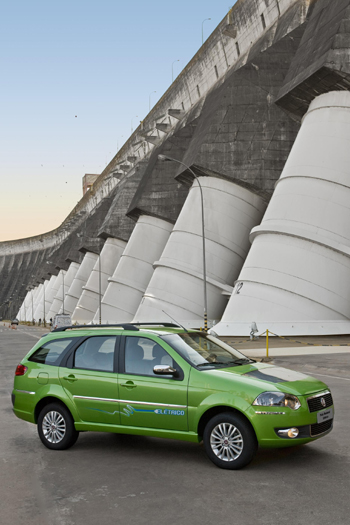

 |
|
The three year research and development
partnership between Fiat Automóveis,
Brazilian hydro-electric company Itaipu
Binacional and battery manufacturer KWO
which started with an electric-powered Palio
pilot project is now expanding into the
production of a fleet of similarly
zero-emission producing Palio Weekend cars. |
|
 |
|
|
|
The
three year research and development partnership
between Brazilian hydro-electric company Itaipu
Binacional, Fiat Automóveis, and Swiss
hydro-electric company Kraftewerke Oberhasli (KWO)
which started with an all-electric-powered Palio
pilot project is now expanding another step with
the production of a fleet of similarly
zero-emission producing Palio Weekend Elétrico
cars.
This
ambitious project got underway in 2006 with the
aim of production a zero-emission vehicle that
also emitted virtually no noise, and developing
the ability to manufacture and commercialise
such a vehicle in Brazil and thus increase the
options in the area of mobility for the
Brazilian consumer. Fiat Automóveis has always
been at the forefront of technological
pioneering and the Brazilian arm of the Fiat
Group was the first to introduce an
alcohol-powered car as well as more recently
becoming the first to commercialise a car that
can run on no less than four different fuel
sources (the Tetrafuel system). The project with
the Itaipu, the state-owned company which
operates the huge hydro-electric dam on the
Brazil-Paraguay border that provides much of
Brazil's electricity, and Swiss fim KWO, got
kicked off with the production of a trial fleet
of Palio Elétrico models that run on electric
motors and have been used in a successful pilot
trial by Itaipu. The Palio Elétrico is fitted
with an efficient electric motor, a battery pack
located in the boot, produces zero-emissions,
and the only noise it emits is the contact the
tyres make with the road surface.
The
next phase of the project is seeing the
production of a fleet of Palio Weekend Elétrico
vehicles. The base car with all unnecessary
components (such as engine, gearbox, water
cooling system, fuel tank, etc) is shipped from
the Fiat Automóveis factory at Betim in the
Minas Gerais region of Brazil, to the giant
Itaipu hydro-electric plant (the largest in the
world) where it is converted in a dedicated unit
on a special production line where it receives
its new electric motor, transmission system and
batteries. The new powerplant delivers standard
power of 15 Kw (20 CV) or maximum useable power
of 28 Kw (37.8 CV) while its normal torque is 50
Nm (5.1 kgm) and maximum torque is 124 Nm (12.6 kgm), all of which allows the Palio Weekend
Elétrico to whizz itself from standstill to 60
km/h in 9 seconds and reach a maximum speed of
100 km/h.
The
compact nature of the new electric motor and
transmission, despite the additional weight of
the bulky new battery pack, allows a 41.5 kg
saving in the estate car's overall weight (1185
kg, along with a useful load carrying ability of
310 kg) compared to the production Palio
Weekend. The 253 V/19.3 Kwh nickel battery pack
allows the Palio Weekend Elétrico to achieve a
range of 120 km and it can be full recharged in
8 hours using any standard (220 V) domestic
power point. The batteries are also fully
recyclable as sustainability has been another
key objective of the project.
Externally the Palio Weekend Elétrico is
identical to its mass-production sister (the
charging socket is located behind the bodyside
flap that usually houses the conventional fuel
filler pipe), however inside there are several
immediately-noticeable visual changes. In place
of the manual gearstick comes a new 3-position
stick (drive, neutral or reverse) while a new
digital LCD display on the centre of the
dashboard informs the driver of the battery's
load, tension, life and temperature, and a new
instrument cluster behind the steering wheel
eliminates the redundant gauges from the fuel
version to just record the speed. Also for
greater safety and security of the occupants the
suspension and brakes (257 mm diameter discs at
the front and 228 mm at the rear) have been
recalibrated.
Currently twenty one Palio Weekend Elétrico
vehicles have been built with the target being
to produce fifty by the end of the first quarter
of 2010. This experimental fleet will then be
used in extensive trials by the partners in the
project: Itaipu Binacional, KWO, AMPLA, CPFL,
Copel and Eletrobrás, as the reality of
commercialising a mass-produced electric car in
Brazil edges yet another step closer.
|